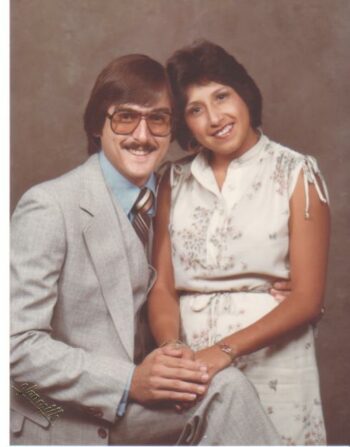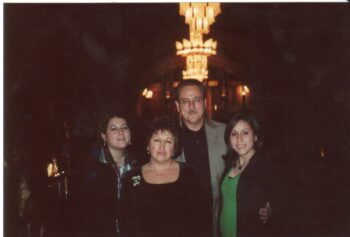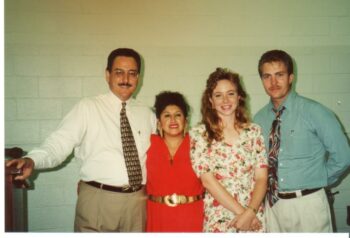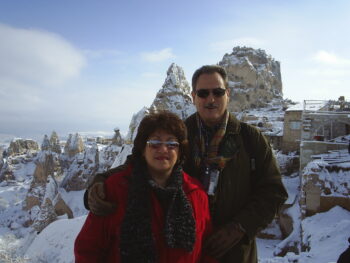The year was 1979, and he earned $400 an hour. But Eric Strutz left lucre to serve Jesus fulltime in visitation ministry.
“I survived,” he quipped on a Door Church Tucson conference video on YouTube. “Actually I thrived. I went from making $400 an hour to 250 bucks a week.”
Now in the sunset of his pastoring career, Eric exemplifies counting the cost for ministry. Time after time, he pursued ministry, not money. Time after time, God came through for him.

Eric Strutz was on a 1-year academic sabbatical from the Eastman Kodak Company at the University of Arizona in Tucson. He had just arrived in town and had no excuse to say no when his apartment manager invited him to church. He had no friends, no events planned.
That evening’s service was about End Times prophecy. Eric was stunned; he had never seen or heard anything like it.
“I made a decision to respond and get saved on Jan. 6 1976,” Eric remembers. It was the same month that Kodak unveiled its instant-developing film to compete with Polaroid. Called Project 130 in house, it was the last one Eric worked on with Kodak.

Kodak had taken pains to NOT violate patents used by Polaroids but notwithstanding found themselves engrossed in a 10-year legal battle that ultimately crowned Polaroid the winner and Kodak the loser. At the end of the day, both companies disappeared from the S&P500 and almost completely from the American consciousness due to the innovation of digital cameras, a phenomenon they both missed. They both became losers, Eric says.
Eric didn’t become a loser. By consistently choosing Jesus over money, he lived in blessing and prosperity, he says.
At the time, his supervisors at Kodak were surprised he didn’t return to the posh office and well-paid position in Rochester, New York.
His church was doing more exciting things. They were planting a church in Clifton, AZ. Never heard of Clifton? You can look it up on Google maps. Or on Wikipedia. The point is, the church was not missing opportunities. Kodak was.
Next came a church to Morenci, AZ, (now pop 1,489).
Then a church to Douglas, AZ (now pop. 16,531).
“We were jazzed,” Eric recalls. “We were excited! Whoa! I was stirred. Things were happening. Marvelous things began to transpire.”
Then came a blockbuster announcement. The Door Church in Tucson was launching a pioneer work into the foreign field. They were going into Aguas Prietas, Mexico.
“We were consumed by a vision from God,” he says.
Nogales, Silver City, El Paso, Cape Cod, Edmonton, Vancouver. The church plants accelerated.
 Meanwhile, God provided for Eric financially. He was named the U. of A.’s first Environmental Health Engineer. He could do consulting on the side, and a rising lawyer tapped him for a precedent-setting case. He was paid $400/hour.
Meanwhile, God provided for Eric financially. He was named the U. of A.’s first Environmental Health Engineer. He could do consulting on the side, and a rising lawyer tapped him for a precedent-setting case. He was paid $400/hour.
In May of 1983, he packed his car for Rochester, New York, to plant a church, saying goodbye to the packed paychecks and saying hello to uncertainty.
“I got my heating bill in Rochester and I had no money,” Eric recalls. “I have to go back to work.”
He was hired by Chicago Pneumatic Tool as a quality control tech. He moved up to final assembly. His employers liked his work, so they made him an offer he couldn’t refuse: “We’re going to double your salary and we’re going to build you your own research lab.”
 His pastor, Harold Warner, called. They were going through a time of transition back at the mother church. Would he come help them?
His pastor, Harold Warner, called. They were going through a time of transition back at the mother church. Would he come help them?
Once again, Eric quit the lucrative job in favor of economic uncertainty serving God.
In 1985, Eric was sent to Colton, CA, where he would start a church from scratch and stay pastoring it until today. With his wife, he’s had two daughters.
Meanwhile, all the companies that offered big bucks and a sure path to retirement have almost all languished and laid off employees.
“I got saved, and God opened my eyes and imparted to my life a vision for the things of God,” he says. “Churches today are in dire need of a vision of what can transpire and of what God can and is doing.”
To learn more about a personal relationship with Jesus, click here.
Related articles: Chris Banducci, Andrae Brooks, Lacy Brunson, Juan Pablo Cardo, Jerry Fussell, Diego Galvan, Robert Michiels, Robert Polaco, Daniel Sherwood, Alvin Smith, Jeremiah Wacker.
About this writer: Michael Ashcraft pastors a church in the San Fernando Valley of Los Angeles.





